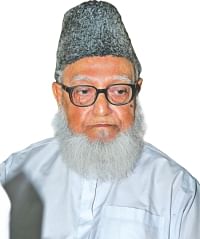Return of the shoe
Return of the shoe
Ghulam Azam's janaza held with huge presence, amid protests, buried at Moghbazar

It was a funeral in front of Baitul Mukarram where people threw shoes at Ghulam Azam in January 1981 as he made his first appearance at any big public gathering after returning to independent Bangladesh.
Thirty-three years have passed but he continues to draw the same ire, even after his death. A young man yesterday threw his sandal at the hearse carrying the infamous war criminal's body to Baitul Mukarram.
"When I saw the hearse pass by, I couldn't control myself. I threw a sandal on impulse," said the youth.
He was among those who gathered in front of the Jatiya Press Club around 11:30pm to prevent the funeral of Ghulam Azam from taking place at the national mosque. They included members of Blogger and Online Activist Network, Chhatra Moitree and Bangladesh Sammilito Islamic Jote.
The protesters tried to reach the mosque marching in a procession but faced police obstruction at the Paltan intersection and thus waited near the police box for about an hour.
As the azan from the mosque was heard through loudspeakers, the hearse, with a motorcade in the front and several truckloads of people at the back, reached the intersection.
"It was about 1:05pm when I saw a young man throw a sandal at the car [hearse]. The Jamaat men escorting the car pounced on him, but police acted quickly and drove away the protesters," said an eyewitness, wishing anonymity.
However, Azam's janaza conducted by his son Abdullahil Aman Azmi was held at Baitul Mukarram, and later he was buried at his family graveyard at the capital's Moghbazar.
"How can a person who read history of Liberation War not despise Ghulam Azam and other razakars for what they did in 1971?" said the 28-year-old youth, son of a freedom fighter, while talking to The Daily Star.
Only 10 days after horrid massacre of the Bangalees on the night of March 25, 1971, Ghulam Azam met Pakistani General Tikka Khan, nicknamed butcher of Beluchistan, the very person who was one of the masterminds of the killings.
The Daily Pakistan on April 6, 1971 reported on the meeting where Azam, the then ameer of East Pakistan Jamaat-e-Islami, and leaders of other anti-liberation political parties assured Tikka Khan of all help.
Azam played the key role in forming notorious militia groups like Peace Committee, Razakar, Al-Badr and Al-Shams that collaborated with the Pakistan occupation military in committing genocide and other heinous crimes against humanity.
On April 8, 1971, he issued a joint statement with other Jamaat leaders.
“India is interfering in the internal affairs of East Pakistan. Wherever patriotic Pakistanis see Indian agents or anti-Pakistan elements and infiltrators, they will destroy them,” said the statement, according to a book titled Genocide '71 exposing collaborators.
Azam and anti-liberation elements used to call the freedom fighters “miscreants”, “Indian agents”, “malaun” (an offensive word used against Hindus), and “infiltrators”.
His evil campaign continued even after independence.
He went to Pakistan on November 22, 1971 and formed the “Purbo Pakistan Punoruddhar Committee” (East Pakistan Revival Committee). There he worked until 1973 to build public opinion against Bangladesh and its recognition by the Islamic world.
Azam went to London in 1973 and set up an office of the committee. He published weekly Sonar Bangla, which was used as a propaganda tool against Bangladesh.
He returned to Bangladesh on August 11, 1978 on a Pakistani passport, and subsequently got back his citizenship and the post of Jamaat ameer.
Shaheed Janani Jahanara Imam, mother of a martyred freedom fighter, initiated a mass movement against Ghulam Azam. But the man, face of war crimes in Bangladesh, didn't give a damn.
On December 13, 2011, just 29 days before his arrest in a war crimes case, he said: “They (court) won't find anything against me for which I will have to apologise to the nation.”
Eighteen months later, he was proven guilty of committing genocide and crimes against humanity in 1971. The court said he deserved death but sentenced him to 90 years in jail considering his old age and poor health.
In the verdict, the International Crimes Tribunal-1 observed: “Prof Ghulam Azam as a de facto superior acted in such a manner which tends us to hold that his prime object was to annihilate the Bangalee nation in the name of protecting Pakistan.”